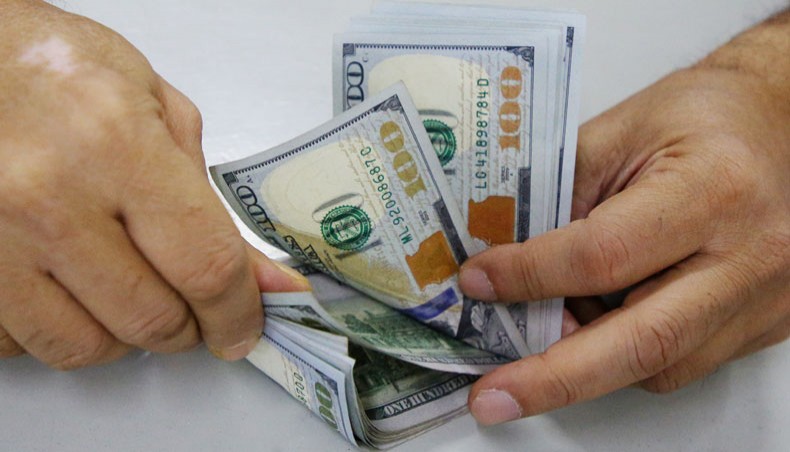
Falling foreign currency reserves against rising foreign loans and tepid export and remittance growth have reduced the country’s capacity to clear foreign debts.
Economists said that the country’s debt repayment capacity had reduced by around 50 per cent in the past seven years, as the overall growth of forex reserves did not match the rising foreign loans taken for development projects.
Besides, export and remittance incomes that ensure roughly 90 per cent of the country’s annual foreign currency witnessed slow and even negative growth in some months of the past two years, decelerating the country’s debt repayment capacity.
Forex reserves are used for maintaining half a dozen financial matters, such as meeting international finance obligations, paying debt, financing imports, and absorbing sudden capital movements.
The country’s forex reserves fallen to around $20 billion from $48 billion calculated by the Bangladesh Bank in August 2021, with exports witnessing only 1.30 per cent growth between July and November of FY24 and remittances 0.24 per cent during the same period.
The country’s foreign debt surged more than double to $95.8 billion in FY23 from $40 billion in FY16.
The growing demand for foreign loans has been attributed to the need for foreign currency to implement development projects, many of which involve loans from bilateral countries with high-interest rates and a short maturity period.
The country’s annual debt repayment has already been projected to almost double to $4.02 billion in FY25 against $2.4 billion in FY22 by the Economic Relations Division, which monitors the government’s borrowings and debts with foreign countries.
Policy Research Institute executive director Ahsan H Mansur said that ERD’s calculation might exclude many foreign loans maturing shortly.
So, the debt will rise quickly in the coming years following the maturity of many short-term foreign loans, he said.
Available information from ERD shows that debt repayment of $569 million per year to Russia for the Rooppur Nuclear Power Plant will start in FY27, following the maturity of repayment of $176 million annually to China for the Padma Bridge Rail Link in the current FY2024.
The debt repayment of $53 million to China has already started in FY23, almost one year before the inauguration of the much-talked-about tunnel under the River Karnaphuli in October 2023.
Another annual payment of $67 million will mature in FY25 for another loan from China for the implementation of the expansion and strengthening of the power system network under the Dhaka Power Distribution Company area.
International Debt Statistics 2023, released recently by the World Bank, presents a graphic description of the country’s debt payment capacity compared to forex reserves, per capita income, and export income.
Almost all the ratios, according to the WB presentation, are on a falling trend when the country needs stable indicators on sensitive data for the uninterrupted graduation process from the least developed countries’ block in 2026.
The county’s reserve to external debt ratio, which was 77.7 per cent in 2016, fell continuously in the following years and stood less than half at 34.8 per cent in 2022.
A high debt ratio means better capacity for payment of foreign debt, while a low ratio means the opposite.
Export incomes that account for a major portion of the country’s foreign currency are also falling, as per the WB report on international debt.
The ratio between the country’s debts and export incomes improved to 190 per cent in 2020 from 110 per cent in 2016 before falling to 160 per cent in 2022.
Export income is highly important for the country since other sources of foreign currency, such as foreign direct investment and foreign loans, are comparatively insignificant.
Only the inflow of remittances has been treated as the major source of foreign currency reserves after export income.
But the inflow of remittance growth in the first five months, July to November, of the current FY24 is a paltry 0.24 per cent as the country received $8.8 billion, compared to $8.7 billion during the same period of FY23.
Masrur Reaz, chief executive officer of the Policy Exchange of Bangladesh, said that the shortage of dollars and the depreciation of local currency by 26.1 per cent alone in FY23, the biggest in 46 years, unleashed double blows on the macro-economy.
As a result, pressure on debt repayment will grow further in the next year, he said, adding that there is no scope to take the matter lightly.
Bangladesh has never failed to repay any foreign creditors in its 52 years of existence. Planning minister MA Mannan said that the present government would do everything to maintain the unique record.
Referring to the recently released ‘Debt Sustainability Report on Bangladesh’ by the International Monetary Fund, the planning minister said that the risk of external debt distress was very low.
‘Still, we have to be very cautious,’ he said.
Commenting on the deterioration of the macro-economy amid repeated calls for improving labour rights by Westerners, the planning minister hoped that the situation would improve after the next general election.
The present government is also under pressure from Westerners to hold the next general election free and fair.
The Westerners have already threatened the imposition of some restrictions in the event of an unacceptable election, which, according to economists, may complicate the current economic woes.
Former World Bank Dhaka office chief economist Zahid Hussain said that the country’s economic integration with Western countries has increased manifold over the decades.
The country’s $52.08 billion worth of exports in 2021–22 were mainly shipped out to countries on both sides of the Atlantic, with the US, Germany, the UK, France, Spain, and Italy accounting for almost 43 per cent. Zahid Hussain said the growing integration had brought challenges for the country’s policymakers to deal with foreign policies carefully so that those did not affect the economy amid changes in global geopolitics.
The economists also said the government should immediately take steps to restructure large loans to be matured in the next two years.
There is no harm or shame in debt restructuring, as many countries do so, said Masrur Reaz.
Economists said the government should launch a study to determine whether the current debt-laden development projects should be continued or the unnecessary, costly projects should be discarded.
Besides, they also asked the government to increase revenue mobilisation to strengthen debt repayment capacity.
NEW AGE









